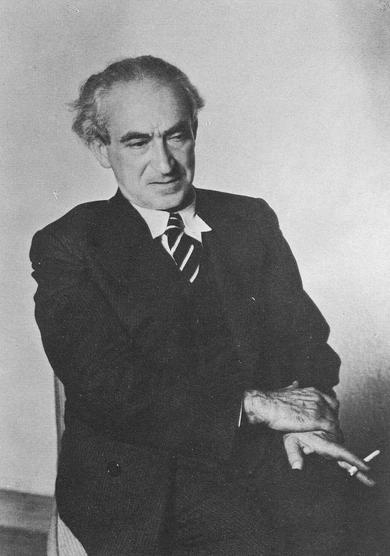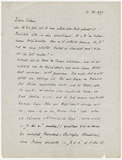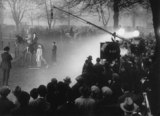Berthold Viertel
Berthold Viertel
Lebensgang
Erdnähe, Sonnenferne / Ist unser Los. / Winzig sind uns die Sterne / Und New York ist groß.
Das Meer schmiegt sich/ uns in die Poren, / Wenn es zu Tropfen zerrinnt. / Wir haben den Weg verloren, / Den wir begannen als Kind.
[Life’s Path
The earth close, the sun afar / Is our lot. / Tiny to us are the stars / While New York is huge.
The ocean huddles into / Our pores, / When it runs to droplets. / We have lost the pathway / We embarked on as children. (ed. trans.)]
Berthold Viertel, Fürchte dich nicht [Don’t be Afraid (ed. trans.)], 1941
| Born | on 28 June 1885 in Vienna, Austria |
|---|---|
| Died | on 24 September 1953 in Vienna, Austria |
| Exile | Great Britain (United Kingdom), United States of America |
| Remigration | Austria |
| Profession | Writer, Dramatist, Theater director, Film director |
Viennese native Berthold Viertel was initially known as a writer of poems, essays and articles published in the magazine Die Fackel issued by Karl Kraus. In 1912 he became dramatic adviser and director at Vienna’s Freien Volksbühne theatre. Periods of working in theatre in Dresden and Berlin followed after the First World War.
Viertel’s film debut came in 1922 with his adaptation of Ibsen’s Nora. Following two more productions he received an offer from Hollywood. Together with his wife, the actress Salka Viertel, and his three sons, he moved to California in 1928. He returned four years later alone and frustrated with the American film industry.
Immediately following Hitler’s seizure of power, Viertel left German once again heading into exile in Britain via Prague. He made three films in Britain, but when he failed to get a work permit in 1939, he fled to the USA. Once there he commuted between New York and Los Angeles, but was unable to pick up on his earlier successes, either on Broadway or in Hollywood. Like his wife Salka, he worked to help other European refugees and was co-founder of various exile organisations, among these “Tribune for free German literature and art in America”. In 1942, the stateless Viertel was given US citizenship.
1947 saw the director return to Europe once again. He worked for the BBC in London and in theatre in Zurich and Vienna, where he staged plays by Tennessee Williams, among others, which he had translated himself. This return was to prove temporary as Viertel’s reservations about his old homeland were too great: he maintained that he could hear the “Reichs Chancellery style” everywhere. Viertel died in 1953 in Vienna.
Selected works:
(Film)
Nora (1922)
Die Abenteuer eines Zehnmarkscheines (1926)
Die heilige Flamme (1931)
The Wiser Sex (1932)
Little Friend (1934)
(Lyrik)
Die Spur (1913)
Fürchte dich nicht! (1941)
Der Lebenslauf (1946)
Further reading:
Siglinde Bolbecher(Hg.): Der Traum von der Realität: Berthold Viertel. Wien: Döcker 1998
Irene Jansen: Berthold Viertel. Leben und künstlerische Arbeit im Exil. New York u.a.: Peter Lang 1992
Siglinde Bolbecher u.a. (Hg.): Viertels Welt. Der Regisseur, Lyriker, Essayist Berthold Viertel. Begleitheft zur Ausstellung im Österreichisches Theatermuseum, Wien: Verlag für Gesellschaftskritik 1988



